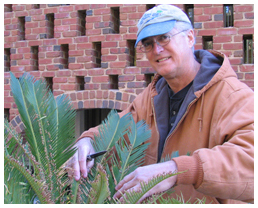Back to news article page
DeLand man gets thumbs up for solution to sago eating scale
POSTED: 05-23-2008
Stetson University alumnus George Taylor’s 1982 Chemistry degree continues to serve him well long after he earned it. The  owner of Water Shed Laboratories Inc. is optimistic that the pesticide additive he developed is the long-sought cure for the Asian tea scale infestation threatening Florida’s sago palms, the slow-growing cycads with lineage that stretches back millions of years. owner of Water Shed Laboratories Inc. is optimistic that the pesticide additive he developed is the long-sought cure for the Asian tea scale infestation threatening Florida’s sago palms, the slow-growing cycads with lineage that stretches back millions of years.
Testimonials from people testing the product in their home gardens echo the findings Taylor has seen in treatments conducted on sago palms on the Stetson University campus and at Sanford Middle School over the past year and a half. Earlier this month, the Florida Department of Agriculture approved his product, a milestone in the long journey toward product release. He also has filed for a patent.
“We are so excited,” said Taylor in an e-mail. “This has taken so long but approval is finally at hand. In terms of product availability and approval by the Florida Department of Agriculture, this means we are ready to market the product. Obviously, it will be an entire new division of Water Shed Laboratories …. In a sense ... this will become an exciting new career for me!” The company is a certified drinking water lab and research facility in DeLand.
Taylor is no stranger to the challenges of new beginnings. The scientist and former corporate chemist is a veteran of the Vietnam War who didn’t start college until he got out of the U.S. Army at age 23. He first earned a degree in Biology from the University of Central Florida. Later, he earned his Stetson Chemistry degree at age 35 after attending classes part-time as a nontraditional student while working a full-time job.
He couples his scientific background with a passion for sago palms and an interest in entomology. Together, these lines of inquiry led to what Taylor calls a serendipitous discovery about how to eradicate the scale pests after he saw them destroying sagos on his property. He shared the story with enthusiasm as he led a tour of treated cycads on campus.
The cycad genus of plants has been around for 250 million years, he noted. “Nothing’s been able to wipe it out. All of a sudden, this scale insect comes along,” he said. “The organism is fragile but secretes a waxy scale – that’s its protection. It lays so many eggs that (parasitic) wasps can’t keep up. I started looking at the insect and figuring out how to get through its defenses.”
The result is an additive consisting of an active ingredient that is a sequestering agent able to penetrate the scale. “It’s a catalyst,” he said. “It penetrates the scale and carries the pesticide into it.”
He worked alongside Bill Gilbert in Stetson’s Facilities Management Division when testing the product on sago palms on campus. Gilbert said he is optimistic about the results he’s seen.
George Taylor checks sago palms in front of Stetson's duPont-Ball Library for evidence of scale. |

